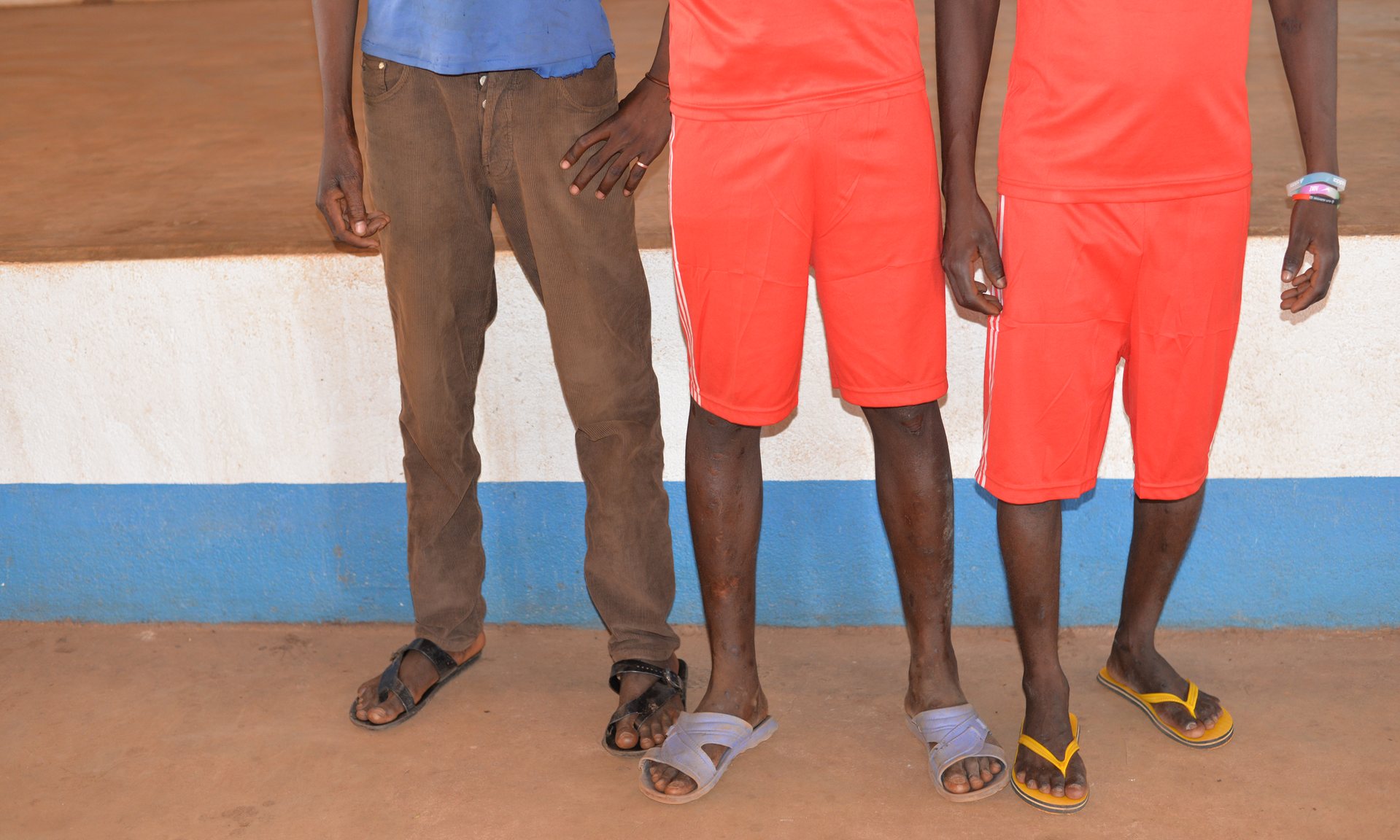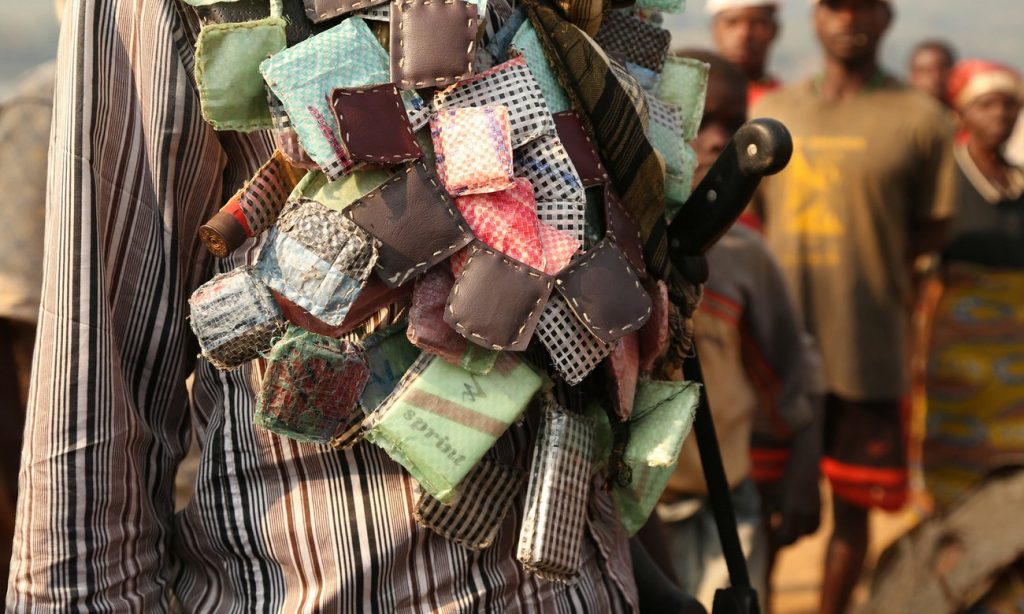Zoudam* sits on a bench and describes how she was raped by a rebel fighter two years ago in this village in Central African Republic. Her voice is flat, her head bowed, and her 12-year-old feet swing nervously above the concrete floor.
“After the rape, he left me. I felt dizzy. I struggled home,” she says. But there was no respite there – Zoudam is an orphan and her aunt beat her for causing trouble. Later, she kicked her out, and Zoudam now lives with an evangelist.
Asked if she was scared when the rebel appeared from behind a bush and grabbed her, Zoudam nods. Are you frightened of men now? She nods again.
One of the invisible casualties of three years of death and destruction here has been childhood.
Many girls were raped, and girls and boys joined militias during a seemingly sectarian conflict that broadly pitted Muslims against Christians and animists, but that is more fundamentally rooted in economic and political exclusion and regional interference after decades of misgovernance and instability.
To say that children fought in armed groups barely hints at the horror of what happened in the thick forests that cover this land.
Zagamin*, 16, joined the anti-balaka (machete) militia when the mainly Muslim Seleka rebels pushed into his town in the Bossangoa region in 2013, shooting people and setting fire to homes. He thought joining them would bring peace.
“We didn’t use weapons, we just had pieces of wood. We went with the older ones on to the battlefield, and when someone was shot and dying, we would go and finish him off, and get the weapon,” he says, speaking through a translator.
Monwen*, 17, fled into the bush with his family when the Seleka rebels arrived in his village on their way to the capital, Bangui, where they would oust the then president, François Bozizé, in March 2013. But then his father decided to return home to check on his cattle. He was shot in the thigh, and Monwen came out of hiding to bring him back to the relative safety of the bush.

Photograph: Clár Ní Chonghaile for the Guardian
“I was with a bigger boy, and he carried him under the chest, and I took the feet. We moved him slowly like that to the temporary camp in the bush,” he says. His father recovered and, fired by a desire for revenge, Monwen set off to join the anti-balaka, carrying the homemade rifle that he used to hunt game.
“I left [the temporary camp] at 3 in the morning. I looked for the anti-balaka for two weeks. I found them in the bush near the river. I fought [for] them. I killed. I fought to avenge my father. I killed to avenge my father.”
After joining the militia, many of the teenagers wore fetishes or drank magic potions to “vaccinate” them against danger. Christian faith and belief in fetishes, or gris-gris, co-exist comfortably here and this anomaly hints at the complexity of a conflict that is about much more than religion.
Today, the teenagers display few visible signs of trauma, but Pulcherie Damaris, a counsellor with the Association of Evangelical Women of Bossangoa, says many have been profoundly marked. The association works with UK-based charity War Child to provide child-friendly spaces – which help children return to a normal routine by offering structured activities, games and informal education – and to reunite families.
“It hurts [to hear their stories] but we have been trained to contain our emotions. A child may burst into sobs, but if you don’t control yourself, you too will start crying, and who will comfort who?” says the mother of five.
“You have to be careful how you treat them. They think what they did was normal. They saw their parents attacked and their things looted and stolen. These children then sought vengeance. So you have to know how to talk to them about it. If you say what a boy did was wrong, he might just get up and leave … You can say, ‘That was bad but you wanted to fight and save your country.’ I try to talk to them like that.”
Damaris also counsels girls who were raped, like Merveille*, who was raped multiple times over three days in Bangui at the start of the crisis. The 17-year-old, who is now pregnant with her first child but has been abandoned by the child’s father, was selling beans and peanuts when she and 10 other girls were snatched by the Seleka.
“We spent three days with them, and were raped many times. We had lost hope. I was sure they were going to kill me.” She keeps her head bowed throughout the interview and fiddles with her leather bracelet. Finally, she was released and made her way back to her aunt. A short time later, Merveille returned to Bossangoa.
She does not go to school now, but stays at home, not least because she faces abuse when she walks around the village. Boys shout out that “the foreigners” have had her, so why can’t they? Many people in CAR believe most of the rebels came from Chad and South Sudan.
Boys sometimes call the raped girls “the Seleka’s women”, says Damaris. “They don’t go into town but I keep telling them their lives don’t end here.”
In December, the UN said more than 60,000 cases of sexual and gender-based violence were documented during the first 10 months of 2015 by an inter-agency group.
Even the foreign forces sent to stop the killing – UN peacekeepers from the Minusca force, African Union soldiers, and French and European troops – have been accused of sexual exploitation and abuse. The head of Minusca has vowed to investigate every allegation and punish those found guilty.
Now, with CAR experiencing a precarious peace following the election of a new president, the teenage former fighters would like to go back to school, but many cannot afford the inscription fees or other costs. War Child is working to get them back to class by enabling them to get birth certificates and pay fees.
The charity’s country director, Eric Mamboue, says that after his organisation and partners started child-friendly spaces, authorities decided to reopen the schools.
“This has been a very positive result as the child-friendly spaces encouraged parents to send their children back to school, and the regional education department also saw this as a good opportunity and decided to reopen the schools.”
“I regret what I did,” says Zagamin. “It was the things that happened that made me join the anti-balaka, but that was a waste of my time. Now that I am out, I want to go back to school.”
Monwen is one of the lucky ones, already back in class. He doesn’t seem to regret his time with the militia, but says that is over now. With an angelic smile, he says his favourite subject is French.
“I would like to be a minister of health. I am studying so that when I become a minister, I will be a good one.”
*Names have been changed to protect the children’s identities

